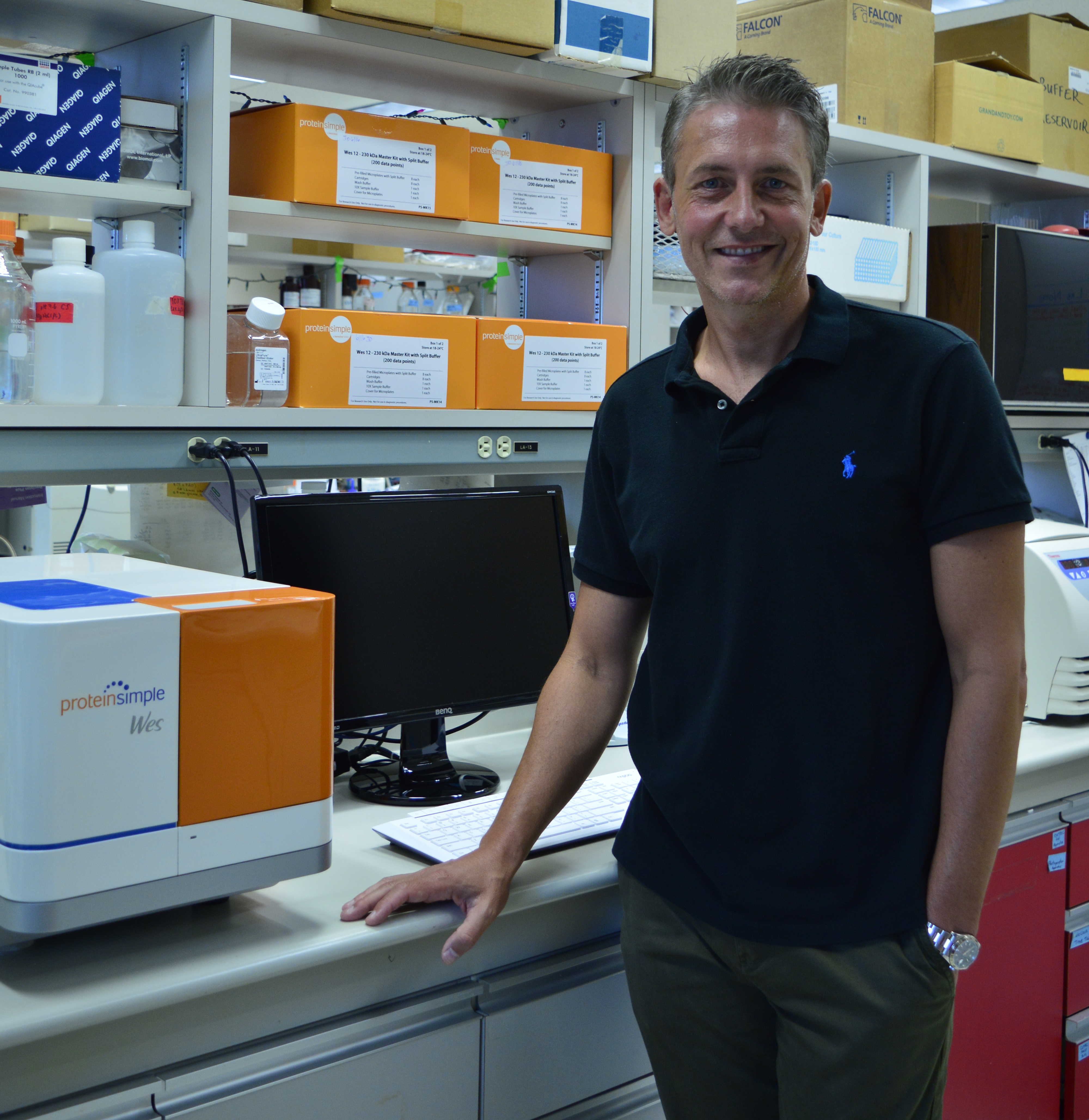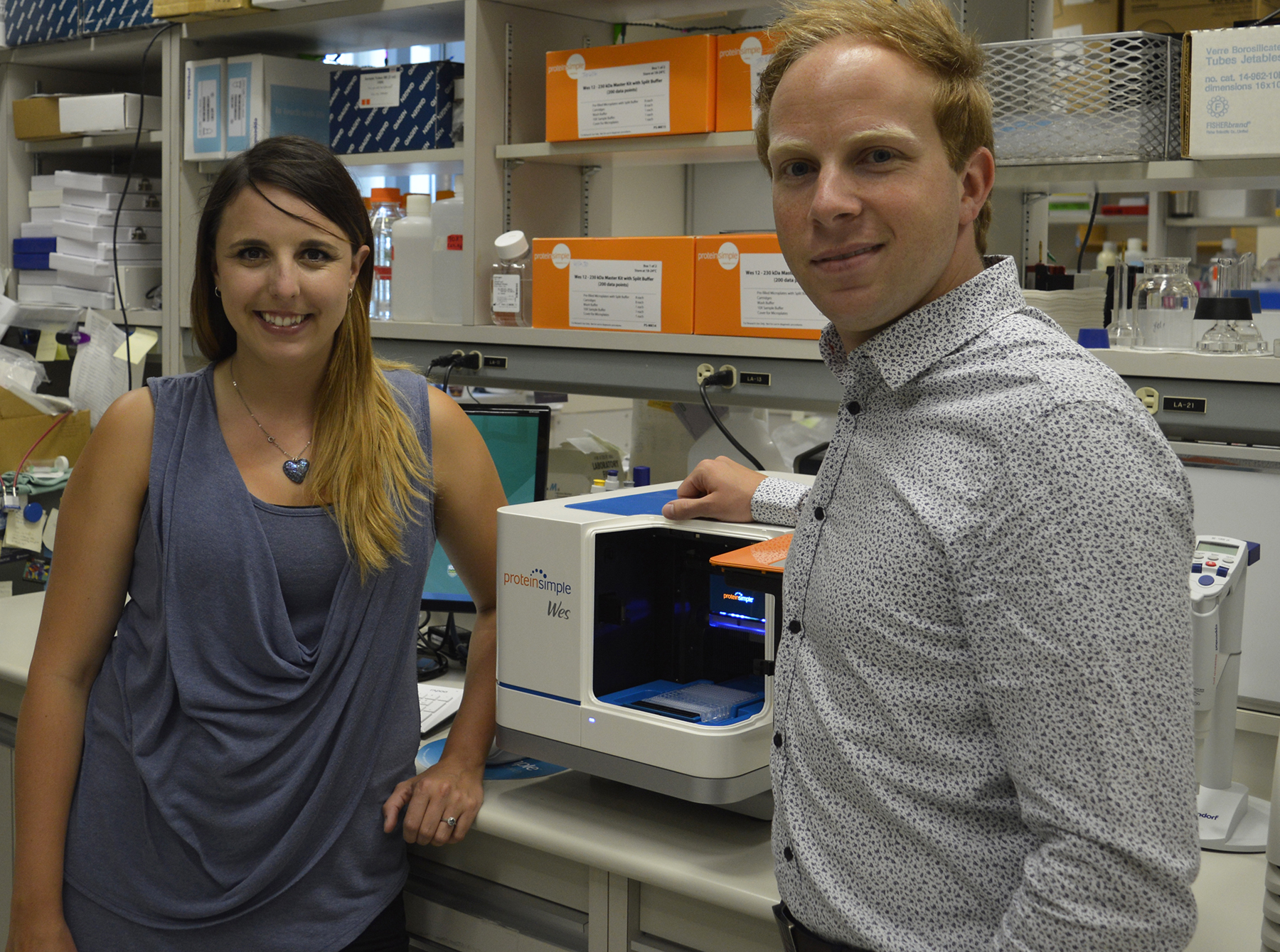
Jason Dyck shows the innovative equipment that will take his lab one step ahead in sustainability.
Research is the foundation of all medicine, from diagnosis to treatment and beyond, but conducting research requires a lot of time, energy and produces a lot of waste.
The Green Labs Program, supported by the University of Alberta's Office of Sustainability, encourages labs across campus to become more environmentally friendly by reducing their energy use, water consumption and production of waste. It can be a tall order as U of A buildings that have labs in them use 43 per cent more energy than buildings without labs.
"A -80C freezer uses as much energy as a house in a year. They're the third-highest user of energy in a lab, behind autoclaves and fume hoods," says Emma Lafreniere, Project Planner of Green Labs at the Office of Sustainability. "What we're trying to do is ensure that our labs are healthy and safe spaces supported by sustainable practices. When we talk about sustainability, we mean providing for our current needs without compromising the needs of future generations."
Jason Dyck's heart research lab in the Faculty of Medicine & Dentistry's Department of Pediatrics has stepped up to answer the call for more sustainable scientific inquiry in a big way. Since joining the Green Labs Program in 2013, Dyck's lab has made tremendous strides towards making the space as effective and environmentally-friendly as possible. In late 2014 it was the first medical research lab on campus to receive Gold Green Spaces Certification; in 2015 they received a Campus Sustainability Leadership Award for their continuous work.
But even the greenest labs have room for improvement.
Jamie Boisvenue is a Cardiovascular Research Technician in Jason Dyck's laboratory in the Department of Pediatrics and is the first to admit that protein analysis research is a highly wasteful process.
"There really isn't a lot in the lab that we can fully replace that has a significant impact," he admits. "I took a step back and thought, what's one of the most important things in our lab that benefits our research the most? Western blotting."
"Western blotting is a main-stay in most metabolic laboratories," explains Boisvenue. "It's very important for proteomics research and understanding the molecular mechanisms in our bodies. But in one week's time, it uses about 75 litres collectively of water, along with plenty of hazardous chemicals."
Western blotting is a process where proteins are separated based on their molecular size, on a 2D gel made up of a polyacrylamide matrix. Once an electrical current is run through the gel, proteins can be separated for a thorough analysis of their interaction and function in the body. Creating the gel is a 24-hour long process that involves several litres of water and uses several known carcinogens and teratogens. There's also a chance of having to repeat the process because of the risk of human error throughout the procedure--creating even more waste.
It was during conversations with Lafreniere that Boisvenue discovered the Sustainability Enhancement Fund (SEF) was available to researchers, providing them the support to make their space greener. With this in mind, Boisvenue began searching for a way to replace the entire western blotting system and found Wes, a revolutionary piece of equipment by ProteinSimple.

Emma Lafreniere and Jamie Boisvenue with Wes.
Wes is about the size of an office printer and uses a new approach to proteomics called capillary electrophoresis. It follows the same process of separating proteins by a charge, but using a specially coated capillary tube instead of a gel. Once the experiment is complete, the sample itself is absorbed into a self-contained sponge and is disposed of in biohazard waste. An additional piece of plastic is cleaned and placed in plastics recycling.
"The traditional blotting method can use up to 300 pieces of plastic and the Wes uses two," says Boisvenue. "What's even better is that Wes can run up to 40 proteins in three days. It would take about a week to run 40 proteins using western blotting."
It sounds too good to be true, which is an argument the team is worried the rest of the research field will make. Western blotting has been used in labs around the world since 1979; introducing results using a new method is expected to be met with resistance.
"ProteinSimple sent a few representatives to conduct a demonstration of the Wes, because we wanted to determine that it was going to put out the same quality of research that we got with the traditional method," Boisvenue says. "What we found was that it does that and then some. We ran samples that were previously done with western blotting to confirm results would be the same. It was a really positive experience and that's why we decided to proceed with purchasing it."
Wes has already been ordered and has arrived at the lab. Once the machine is optimized to suit the needs of the lab's research, ProteinSimple will send representatives later in the summer to help train the rest of the team on the instrument. The lab plans to run samples using both the Wes and western blotting to prove the accuracy of test results.
"I think the most important thing that researchers will have questions about when they come through our lab is how this is different from what's being done: how is your research being compromised, or is it being compromised? Are you still able to maintain the same quality of research?" Boisvenue says.
"This is the first machine of its kind at the University of Alberta and the first in Alberta. If it proves its worth, this could lead to collaborations between labs and researchers-- and could be the start of huge change. That was one of the biggest deciding factors for us: it's high risk, high reward."
Meet our partners in innovation
The Office of Sustainability serves as the hub of the University of Alberta's Campus Sustainability Initiative. It provides support of institutional leadership, campus-wide communications and encourages sustainable practices, policies and procedures throughout the University.
The Sustainability Enhancement Fund Grant Program is stewarded and administrated by the Office of Sustainability. Any student, staff or faculty member can apply for a grant to support green initiative projects they would like to implement. Grants are distributed at $2,000 to $50,000 per project and all are encouraged to apply. For more information and to apply, please visit the Sustainability Enhancement Fund.